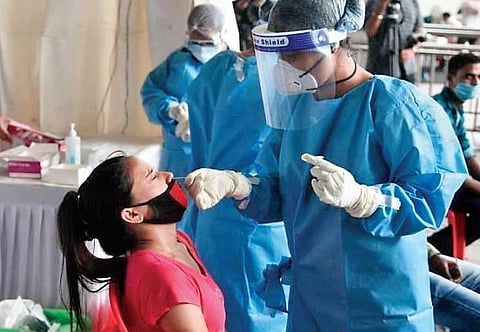

INDORE: A 33-year-old woman who had returned from the Maldives tested positive for JN.1 sub-variant of coronavirus in Madhya Pradesh's Indore, an official said Friday.
The patient was found infected with the virus last month and has since recovered, he said.
The woman tested positive for coronavirus on December 13.
Her sample was sent for whole genome sequencing (WGS) at Bhopal-based All India Institute of Medical Sciences (AIIMS), and the report, which arrived on Thursday, confirmed that she was infected with JN.1 sub-variant, said Dr Amit Malakar, nodal officer of the district unit of the Integrated Disease Surveillance Program (IDSP).
He said that the patient was home quarantined and recovered last month.
Nine patients are in treatment for coronavirus in Indore district, of whom seven were under home isolation, and the remaining are hospitalised, Dr Malakar said.
Covid-19 sub-variant JN.1 has spread to 16 states with over 970 cases of the infection reported till January 11, official sources said.
According to sources, Maharashtra has reported a maximum of 250 cases of JN.1 sub-variant of COVID-19, followed by Karnataka with 199 cases of the infection.
ALSO READ | 2023: Year of infections
Similarly, 155 cases of the infection were reported in Kerala, and 94 in Andhra Pradesh. 80 cases have been reported in Gujarat, 49 in Goa, 30 in Rajasthan, and 26 each in Tamil Nadu and Telangana.
Meanwhile, 25 cases of JN.1 sub-variant have been reported in Chhattisgarh, 22 in Delhi, 8 in West Bengal, 3 in Odisha, 2 in Haryana, and one each in Madhya Pradesh and Uttarakhand, they claimed.
These samples were collected between November 10 and January 8, 2024, they said.
1452 samples were sent for Whole Genome Sequencing (WGS) in December 2023 while 1026 samples have been sent in January 2024 to date, as per the data.
The World Health Organization (WHO) recently classified JN.1 as a variant of interest, distinct from its parent lineage BA.2.86. However, the global health body emphasized that the overall risk posed by JN.1 remains low based on current evidence.
Both the central and state governments are keeping a close watch on the new Omicron sub-variant JN.1.
Several countries, including China, Indonesia, the Philippines, Malaysia and Singapore, have reported upticks in new coronavirus cases. The JN.1 strain, first detected in September in the United States, is a descendant of BA.2.86, a highly mutated variant of the Omicron strain of COVID-19.